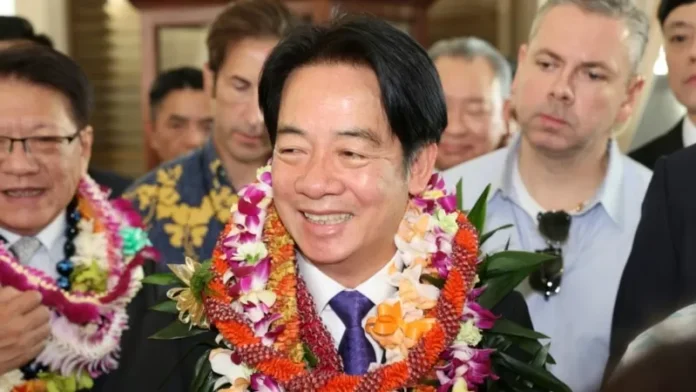Beijing has once again urged the United States to refrain from interfering in its internal affairs and to stop sending “wrong signals” to Taiwan, after news broke that Republican U.S. House Speaker Mike Johnson held a call with Taiwan’s President Lai Ching-te.
The call took place as Lai is currently on a Pacific tour that includes a visit to the American territory of Guam, much to the displeasure of China. Taiwan’s Presidential Office confirmed the call but did not provide any details on the discussion.
China has long considered Taiwan as a part of its territory and has repeatedly stated that it will not hesitate to use force if necessary to bring the self-governed island under its control. Therefore, any actions or statements that could be seen as supporting Taiwan’s independence are viewed as a direct threat to China’s sovereignty.
In response to the call, Beijing’s foreign ministry spokesperson Lin Jian urged the U.S. to “deliver on the promises of American leaders not to support Taiwan independence, to stop interfering in China’s internal affairs, and to stop sending wrong signals to Taiwan separatist forces.”
He also emphasized that the U.S. should recognize the serious danger that separatist acts of Taiwan independence pose to peace and security in the region. “The Taiwan issue is the very core of China’s core interests,” Lin Jian stated during a regular press briefing, adding that China will take “resolute and effective measures” to defend its sovereignty.
It is worth noting that the United States does not have official diplomatic ties with Taiwan but has an agreement to provide the island with the means to defend itself. This arrangement has been a source of tension between the U.S. and China for years, with Beijing viewing it as a violation of its “One China” policy.
In a separate statement on Thursday, China’s foreign ministry announced sanctions on several U.S. companies and individuals for selling arms to Taiwan. The targeted companies include 13 firms involved in the production of drones, unmanned aerial systems, and other military products. The sanctions also cover six top executives at companies such as Raytheon and BAE Systems.
According to the statement, the sanctioned companies will have their assets in China frozen and will be prohibited from trading with Chinese firms. The executives will also be banned from entering China, including Hong Kong and Macau.
China’s strong reaction to the call between U.S. and Taiwan officials highlights the sensitivity of the Taiwan issue for Beijing. The country sees Taiwan as a renegade province that must be reunited with the mainland, and any actions that could be seen as supporting Taiwan’s independence are met with swift and severe consequences.
The U.S. has repeatedly stated that it does not support Taiwan’s independence, but it also maintains close ties with the island, including providing it with necessary defense capabilities. This delicate balance has been a source of tension between the two superpowers, and China’s recent actions show that it will not hesitate to take a strong stance against any perceived threats to its sovereignty.
The situation in the Taiwan Strait is a delicate one, and any actions or statements from either side could potentially escalate tensions and lead to a dangerous confrontation. It is crucial for both the U.S. and China to exercise caution and refrain from taking any actions that could further strain their already complex relationship.
In the end, it is in the best interest of both countries to maintain stability and peace in the region. As two of the world’s largest economies and superpowers, the U.S. and China have a responsibility to work together to find a peaceful resolution to the Taiwan issue and other areas of disagreement. Only through open and respectful dialogue can a lasting solution be achieved.

